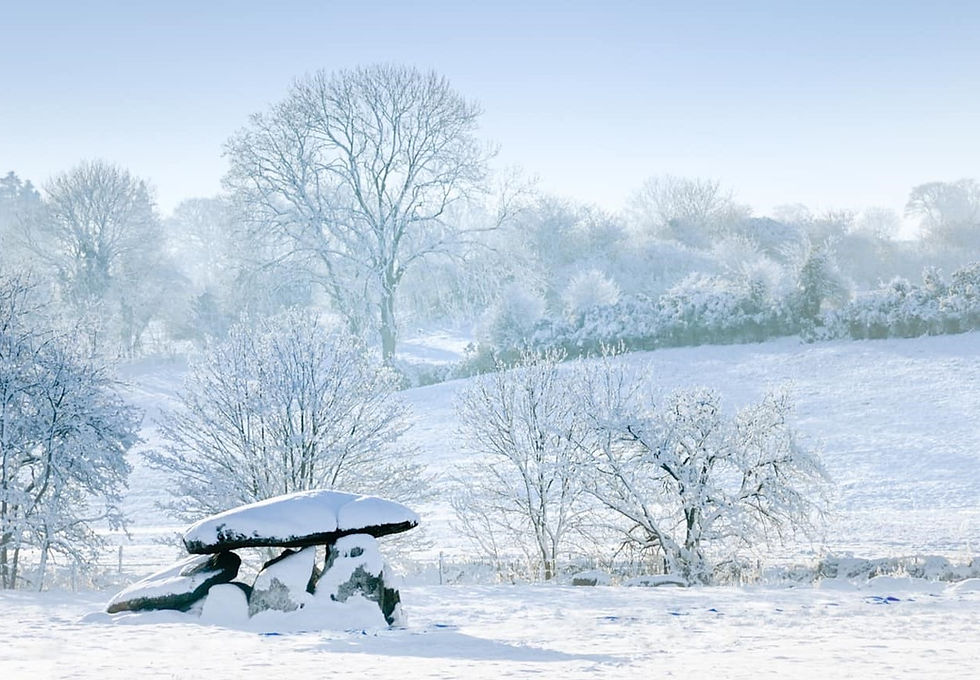To Rise Like a Tide – On Resisting Hopelessness in a Time of Unmaking
- The heART of Ritual

- Sep 15, 2025
- 3 min read

It would be tempting, these days, to curl into the dark – to say the work is too great, the damage too deep, the hunger too vast. That we are too late. That too much has already been lost.
But the land remembers differently.
There is an old story, long buried under concrete and broadcast static, where the bones of the world still hum with song – a song of the possible, rising through the cracks. And that story is not finished.
In Irish tradition, we have long walked the edge between worlds – between seen and unseen, between despair and devotion. Our cosmology never promised us certainty. It gave us the hag-stone and the threshold, the sídhe road and the storm. It taught us how to navigate unsteady ground. The Cailleach Bhéarra, our winter grandmother, knew the weight of what it is to endure – to bear loss, to carry storms, to begin again. She shaped the land with her staff and her sorrow. And still, the seeds slept under her frost.
We have known these times before, though not quite like this – where the sea throws up plastic bones, and the air forgets how to breathe. Where grief sits heavy in the groundwater, and even the birds fall silent. But to despair entirely is to forget the old pact – the one made between us and the land when we were still in right relationship.
That we would not abandon one another.
That we would listen when the land called.
That we would remember ourselves as kin.
There are those who speak now of collapse as though it were final. But collapse is only ever a moment in the longer turning. In our own myths, the world has ended many times – only to be remade by those who carried ember in their ribcage, who remembered how to blow softly into ash.
When the Tuatha Dé Danann were driven underground, they did not vanish – they became the Aos Sí, the people of the mounds, the hidden folk who hold the memory of how things used to be. That memory is still alive, and it is not only theirs to hold. We too are called now – not to fantasy or escape, but to a deeper invocation.
This is not the time to wish away the dark. It is the time to walk it with courage – to carry light, not because we are unafraid, but because we choose not to forget the way.
Hope, in this sense, is not naive. It is not the brittle, candle-in-the-window sort of hope that refuses to look at the storm. No – true hope is moss-covered and wind-calloused. It grows from soil and song, from people who show up again and again despite no guarantee of outcome.
It is grá – fierce love, braided with grief and wild remembering.
It is the willingness to stand in the gap – to re-enchant a world that has forgotten the sacred. To speak to the stones. To tend the wells. To listen when the ancestors and (more than human) guardians of place come knocking.
We must become, now, a priesthood of place – not through vestments or titles, but through attention. Through tending. Through invoking what has been exiled.
The Irish word beannaithe means blessed, but also marked. And these times mark us, deeply. But the question is – what will we do with the mark?
Will we take our grief and let it harden us – or will we let it compost into soil, feeding roots that may yet hold?
There is still time to write a different story.
To remember what it is to be of the earth, not above her. To place our hands in bog and bramble and say – I have not forgotten you. To stand at the stone circles, not as tourists but as kin. To speak aloud to the rising waters and say – we will learn to listen now.
Because we are not just watching a world unravel – we are being called to weave.
And so – gather your spindle. Gather your song. Gather the old names and the sacred herbs and the stories your grandmother told when the fire was low. We will need them all.
This is the season of the tide-turners.
The hag-staff holders.
The rememberers.
And we are not alone.
“There’s no such thing as too late” – the land says – “there is only whether or not you’ll begin.”
© 2025 Niamh Criostail and Heartlands Publishing. All rights reserved. Original painting by Niamh Criostail.


